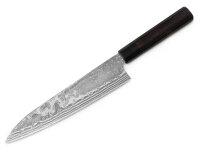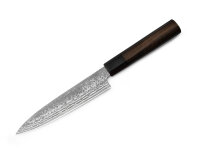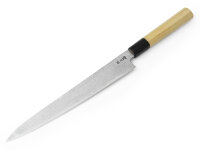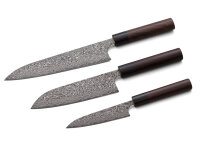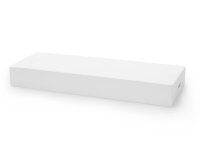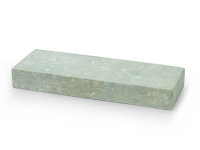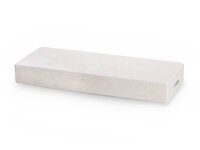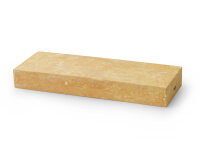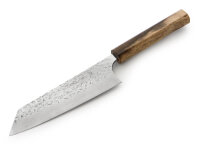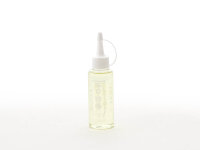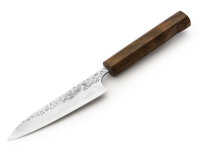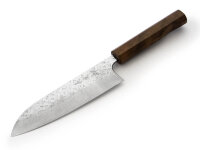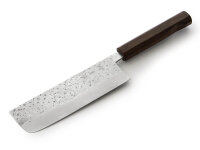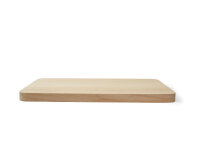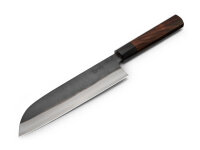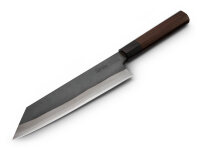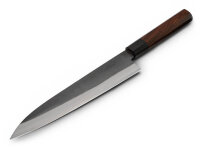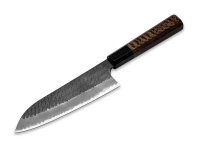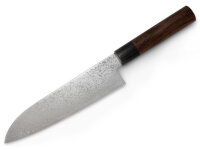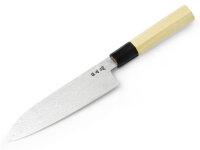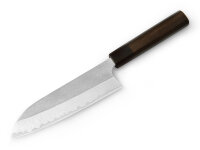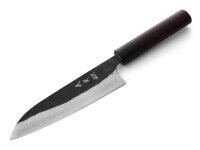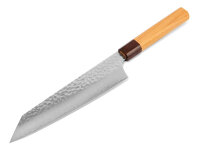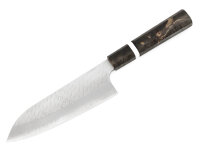"Damascus knife Kyusakichi Santoku, ZDP189"
Smiths - tools for daily life
Early, in the ancient times, there were many craftsmen called \"Field Blacksmiths\" on the Japanese island of Kyushu. These blacksmiths supported the daily life of local people by making and repairing various kinds of tools for them. These tools included knives and cutting tools for cooking, farming, fishing, forestry, and many other work uses. Yoshida Hamono Co, Ltd. was founded as Field Blacksmith. In the long history of the company, Yoshida has forged many different kinds of cutting tools for a wide range of customers. Traditional craftsmanship, proven production technology and high expertise have been passed down from generation to generation in the workshop, constantly improved and added to. Cooking knives should be beautiful, but they also have to prove themselves as tools that can be used every day. The longer they are used and cared for, the better they feel in the hand and the stronger the bond between the tool and the user becomes. In general, the Japanese also take great care of utilitarian tools with the goal of long-lasting use. Yoshida's aim is for its products to match this mentality, to satisfy as best as possible the desire for products with a long service life in Japan and among all international customers. This is only possible through the highest quality and care from material selection to manufacturing and delivery.
ZDP-189, the new premium knife steel
ZDP-189 represents the highest grade stainless steels manufactured by Hitachi Metals Ltd. Hitachi is a highly respected steel manufacturer in Japan, with many well-known knife steels coming from its house. The powder metallurgical steel ZDP189 was developed especially for cutting tools. It has a particularly fine and uniform microstructure and combines three properties that are highly valued in cutting tools: very high sharpening potential, very high sharpness retention and excellent corrosion properties. ZDP-189 achieves these properties with its unusual alloy: 20% chromium, 3% carbon, etc. The steel is not easy to work but extremely hard to forge. An experienced blacksmith can achieve a hardness of up to 67 HRC, the highest value we know for knife steels.
How to use
Japanese chef's knives are made of extremely hard steels and are forged and ground thinner than their European counterparts. Some of these knives have very finely ground cutting layers, making them more delicate and suitable only for soft cut foods. Please refer to the product details for information in this regard. In particular, knives with a very thin cutting edge and hollow grind are prone to chipping on the blade. These are excellent for fine cuts of soft cut material, but should be used with appropriate care. Sharpening on a whetstone usually produces an angled grind, which makes the edge more stable over time.
Breakouts on the cutting edge can also occur due to leverage forces as well as frozen cuttings, which significantly reduce the temperature of the steel. Leverage forces often occur when cutting material with bones, for example. Chipping on the cutting edge may need to be ground out by a professional.
The knife should always be guided straight with pulling or pushing cut, without much pressure. To maintain sharpness, avoid cutting on stone, glass or other hard surfaces. Never use \"sharpening steel\" for resharpening. Water sharpening stones are recommended (grit: 400-1200 for preliminary sharpening, 3000 for fine sharpening, 6000 or more to strip the blade) and a honing leather if necessary.
Please keep the knife away from children. These knives are extremely sharp, please be careful.
All products are unique, slight deviations from the exemplary picture are therefore possible.
Care instructions
When using knives made of delicate types of steel, such as Aogami, Shirogami or V-Toku, please clean them occasionally with a cloth and water even during prolonged use. However, acidic foods can still cause discoloration on these classic carbon steels. After use, please wash by hand with hot water and use a neutral dishwashing detergent if necessary. Please do not put the knife in the dishwasher under any circumstances. After cleaning, dry thoroughly, oil if necessary, and store in a well-ventilated area. Residual moisture can cause rust in non-stainless steels. See our posts on the ORYOKI Japan blog for product care.
Clean the knife by hand and do not use a dishwasher. Dry it thoroughly afterwards.

